The whole thought of hand embroidering two sets of curtains seemed a bit daunting, once I sat down to really consider the project carefully. With brand spankin’ new curtains hanging before me and a roll of tracing paper on the table, I started fiddling, and thinking, and doodling, and … eventually… despairing! Then, I went back to my e-mail. Do you know what the best thing about hand embroidered curtains is?
The very best thing about hand embroidered curtains is the fact that, when I wrote the last post presenting my plan to hand embroider new curtains for a new room, I heard from many who people who have hand embroidered their own curtains, or who have hand embroidered curtains in their homes.
Many folks sent suggestions on types of stitching and types of patterns, and when I started going back through the e-mails I received on the subject and the comments and ideas that were left on the original post, I felt much more inclined to tackle the project! I was excited again about it, thanks to your encouragement, comments, and suggestions. So, that’s the Best Thing about hand embroidered curtains – I heard from a lot of really nice people!
Some readers even sent photos of hand embroidered curtains:
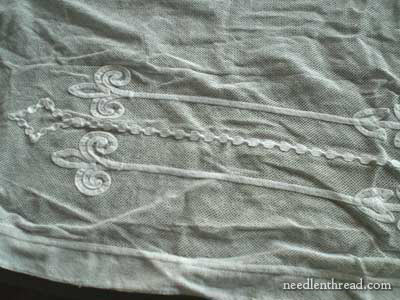
Méri thinks that these curtains were made by her mother. Recently found, when they were unpacked, they were discovered to be in bad shape. But they are beautiful! It looks like the design is made with tapes, like the kind used for making Battenburg lace.
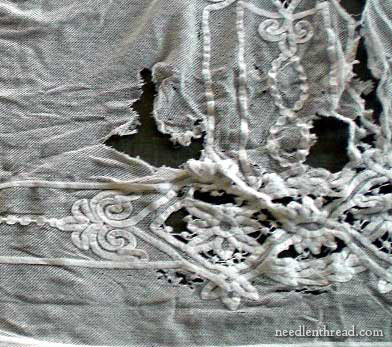
Where the design becomes more intricate is where the majority of the damage is. In this technique, the tapes would be stitched onto the fabric, and then connections would be made between them, in the areas where the fabric is to be cut away. What elegant curtains these were! And I love the natural color, with the lighter design!
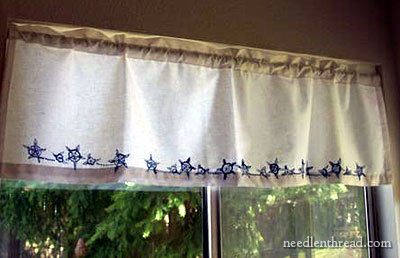
Janice hand embroidered the hem of her kitchen valance, in blue flowers. I like the embroidery along the hem. This is something I had considered – a line of flower or something similar, along the hem and down the center edges of the two curtain panels (where they meet). What I like about Janice’s design is the “random” look of the flowers, and the way they seem to be kind of … well… dancing. I love this valance, and it gave me a jolly idea for the kitchen window!
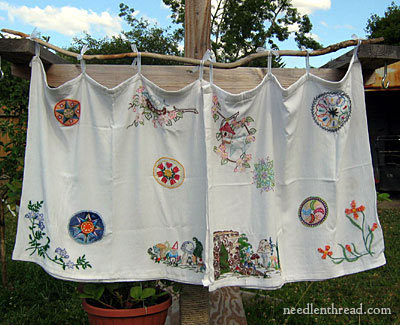
Mrs. Kitty went all out on her curtains! She made them a sampler of sorts, with a wide range of motifs on them. You really must look at her up-close photos of this embroidery project! It took her almost two years to complete the panels, the results of which are a sampler of varied techniques, colors, and motifs – truly an amazing job, and what a conversation piece! Fun!
After pouring over the various e-mails and comments, I went back to the table – literally, the drawing board – and looked at my curtains and my roll of tracing paper.
I knew what I wanted: simplicity. All the doodles I had doodled went into the trash. Too many scroll, too many flowers. I drew straight lines at 4 inch intervals on the paper – varying the lines in length from 24 inches to 40 inches. Then, in one on-going “sweep” I drew my embroidery designs. And they are, to say the least, simple!
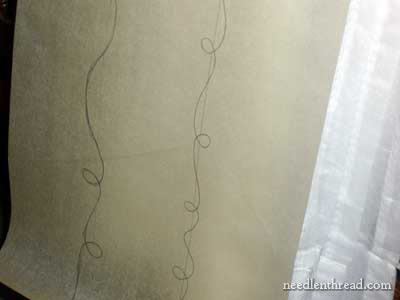
Wavy lines with random loops – that’s it. I liked the recurring suggestions I received from readers of doing shadow work on the cotton voile, so, where the lines wave (but not where they loop), I’ll take the lines a bit wider and stitch herringbone stitches (to create the shadow) on the back, leaving the front looking like backstitch. Where the waves come back together in one line to make the loops, I’ll switch to straight backstitch. Then, to finish off the look of the backstitch, I’ll whip it with the same color thread.
I might – but I don’t guarantee it – add a few random small flowers between the wavy lines, here and there, maybe worked in a combination of ribbed spider web and daisy stitch.
And that’s my plan, which brings me to the second best thing about hand embroidered curtains: they can still be hung, until I get to each panel.
I plan to transfer the wavy lines onto one panel today. The room won’t be finished until early next week, when I’ll hang the curtains until I can get to stitching on them.
I can’t wait to get started! And thanks to all who left comments and sent e-mails with ideas and suggestions! I really appreciate it!


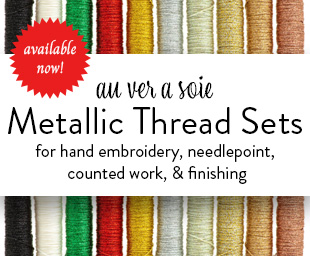

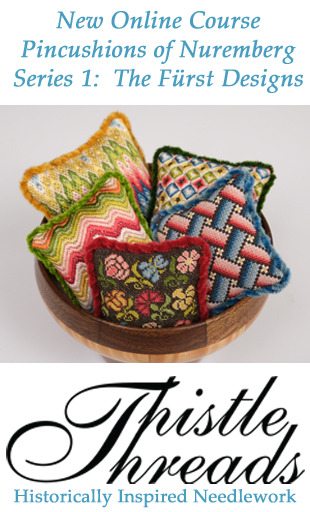
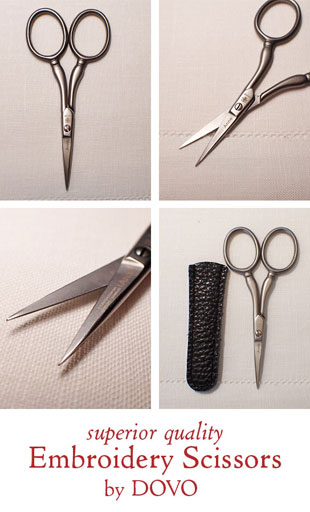
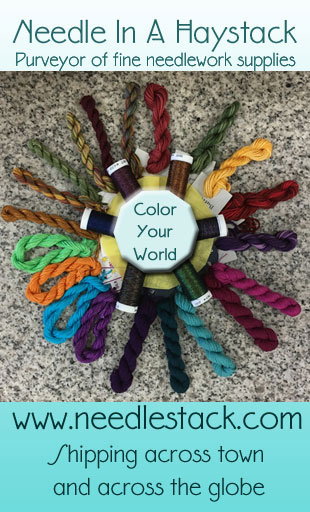
Hope the transfer goes ahead smoothly and you get to start sewing soonest!
Gosh, me, too, Megan! As life would have it, I still haven't been able to get to it today. I have a school meeting this evening, and maybe after that? If not – Tomorrow? I hope so!
Surely your curtains will look great!
Ooh, good idea! That looks like a great way to add interest to the curtains while keeping the stitch time to a minimum. I once saw a decorative throw with large chain stitched vines and flowers in the same color as the background fabric – it was very elegant, and looked like it would be easy to do.
My grandmother’s hand-embroidered curtains are different…..she made the designed and chose the colors of the threads accordingly to the pattern. The basic material is a dark green wool cloth…….visually all together giving a beautiful screen.
I believe my grandmother had in her mind to hang these panels of curtains in front of two wood swinging doors, between the hallway and the living room.
These curtains have been carefully saved, and protected from sunlight, surprisingly showing no damage to material or colors.